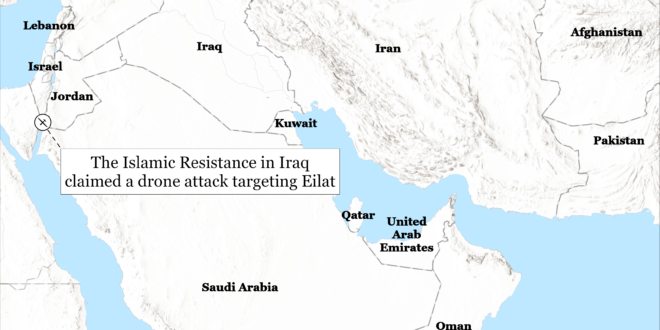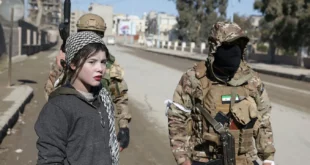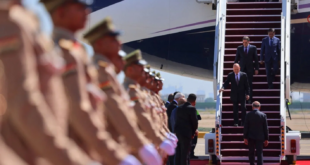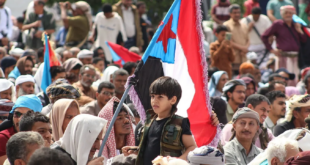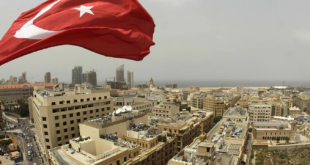Israeli Prime Minister Benjamin Netanyahu addressed a joint session of the US Congress on July 24.[1] Netanyahu described his vision for “a demilitarized and deradicalized” post-war Gaza Strip but did not offer details about how to achieve this vision.[2] Netanyahu further said that Israeli would need to ”retain overriding security control” over the Gaza Strip for the ”foreseeable future” to prevent the resurgence of Hamas.[3] Netanyahu added that the Gaza Strip ”should have a civilian administration run by Palestinians.”[4] He did not directly comment on the ongoing ceasefire negotiations but said that the war would end “tomorrow“ if Hamas surrenders, disarms, and returns all the hostages.[5] He said that, if Hamas does not, Israel will fight until Hamas is destroyed militarily, its rule of the Gaza Strip is ended, and Israel frees all the hostages.[6] Netanyahu said that he prefers a diplomatic resolution that returns residents of northern Israel to their homes but that Israel “will do whatever it must do to restore security,” in reference to expectations that Israel may conduct a major military operation into southern Lebanon against Lebanese Hezbollah.[7] Netanyahu also proposed creating a new security alliance of regional Arab states that he termed the ”Abraham Alliance” to balance against Iran and the Axis of Resistance.[8] Netanyahu said that the US-assembled coalition that successfully defended Israel from the April 13 large-scale Iranian drone and missile attack shows the potential of such an alliance.[9]
Egypt may agree to a long-term Israeli presence along the Egypt-Gaza Strip border, according to an anonymous Israeli official.[10] Egypt and Israel have not yet reached an agreement on control of the Philadelphi Corridor, however, which separates Egypt from the Gaza Strip. Cairo has vocally opposed in recent months any Israeli presence along the Philadelphi Corridor.[11] Israeli forces took control of the corridor in May 2024 and have since consolidated their position by creating 800-meter buffer zone.[12]The anonymous Israeli official suggested that recent discussions between Egypt and Israel have made progress toward a long-term arrangement that allows the IDF to remain around the Philadelphi Corridor.
An enduring IDF presence along the Philadelphi Corridor would complicate ongoing ceasefire negotiations but provides a better guarantee against Hamas rearming. Hamas has demanded repeatedly that Israeli forces withdraw from the Philadelphi Corridor in a ceasefire and hostage exchange deal.[13] But Israeli officials consider controlling the Philadelphi Corridor as necessary to prevent Hamas from importing military materials into the Gaza Strip.[14] Hamas could use such materials to support its larger effort to rebuild its weapons production capacity and reconstitute its forces.[15] The IDF has called the corridor Hamas’ “lifeline” that Hamas needs to replenish its military resources, such as explosive materials, supplies, and weapons.[16]
The discussions about a lasting Israeli presence along the Philadelphi Corridor are part of a larger series of conversations about how to manage the corridor in the long term. The United States, Egypt, and Israel have reportedly considered alternative smuggling interdiction methods, such as constructing a high-tech and deep-buried border fence.[17] Israel also reportedly considered involving the United Nations and Gazans who are not connected to Hamas in managing parts of the border, such as the Rafah border crossing.[18] Israeli Prime Minister Benjamin Netanyahu said that he would not consider an IDF withdrawal from the corridor on July 12, tabling these alternatives to long-term Israeli control of the corridor.[19]
Lebanese Hezbollah published drone footage of an Israeli airbase in northern Israel on July 24 as part of an effort to deter Israel from launching a major military offensive into Lebanon.[20] The drone footage showed the IDF Ramat David airbase, which is about 50 kilometers from the Israel-Lebanon border. The footage included purported details of the airbase, such as the locations of air defenses, aircraft shelters, and fuel storage units.[21] This video marks the third time in recent months that Hezbollah has published drone footage of critical Israeli sites.[22] These videos are meant to demonstrate Hezbollah’s ability to reach these sites while terrorizing Israeli civilians and military personnel. The videos could also communicate information about critical Israeli targets to other members of the Axis of Resistance.
The United States and Iraq continued discussing their bilateral security partnership, which is in conflict with Iranian-backed efforts to expel US forces from Iraq. US and Iraqi delegations concluded their two-day Joint Security Cooperation Dialogue in Washington, DC, on July 23.[23] The dialogue covered ending the International Coalition’s mission in Iraq and transitioning the US presence in Iraq to part of a bilateral security relationship.[24] US Defense Secretary Lloyd Austin stated that the United States will continue to develop and strengthen its security partnership with Iraq.[25] Iranian-backed Iraqi militias have conducted around over 160 attacks targeting US forces in Iraq and Syria since the Israel-Hamas war began in order to compel Washington to withdraw its troops.[26] The militias paused attacks in February 2024 but announced on July 19 that they would resume attacks since Iraqi Prime Minister Mohammad Shia al Sudani had failed to set a timeline for the complete withdrawal of US forces.[27]
Key Takeaways:
- Israel: Israeli Prime Minister Benjamin Netanyahu addressed a joint session of the US Congress to discuss the Gaza Strip, Lebanon, and international efforts to counter Iran and its Axis of Resistance.
- Gaza Strip: Egypt may agree to a long-term Israeli presence along the Egypt-Gaza Strip border, according to an anonymous Israeli official.
- Lebanon: Lebanese Hezbollah published drone footage of an IDF airbase in northern Israel as part of an effort to deter Israel from launching a major military offensive into Lebanon.
- Iraq: The United States and Iraq continued discussing their bilateral security partnership, which is in conflict with Iranian-backed efforts to expel US forces from Iraq.
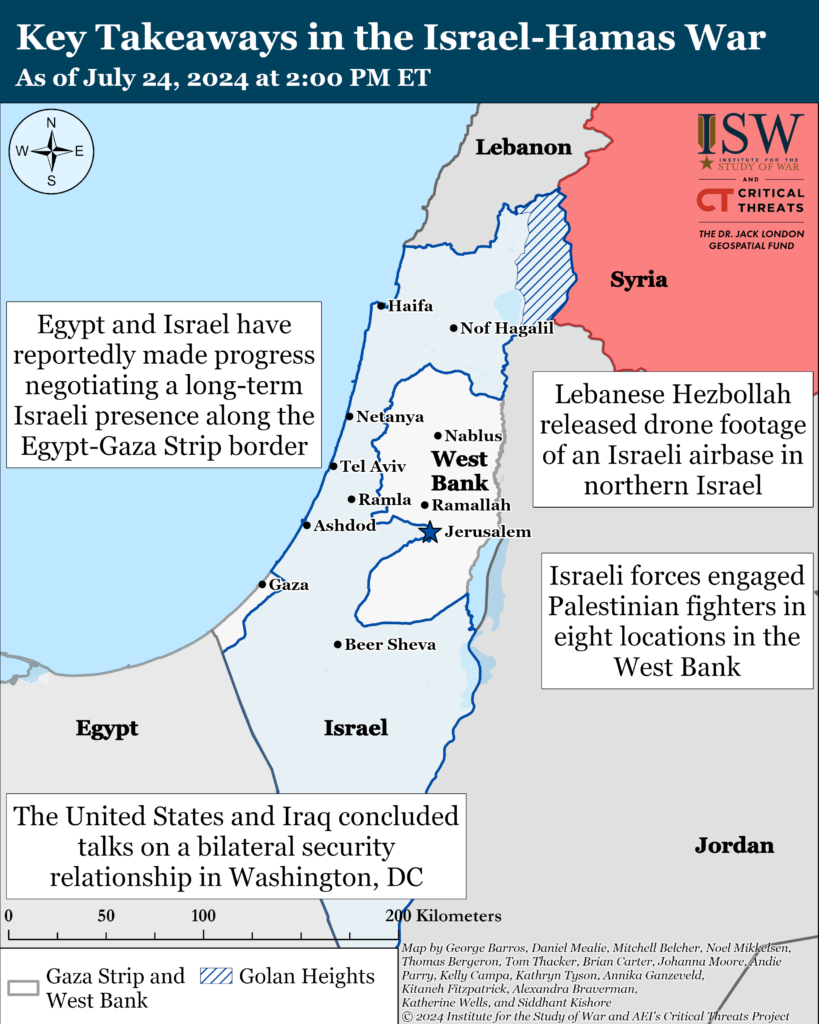
1 day ago
Iran Update, July 24, 2024
Andie Parry, Johanna Moore, Annika Ganzeveld, Alexandra Braverman, Kelly Campa, Kathryn Tyson, Siddhant Kishore and Nicholas Carl
TIP
X
MAKE A TEXT SELECTION TO ADD COMMENTS
Information Cutoff: 4:00pm ET
The Iran Update provides insights into Iranian and Iranian-sponsored activities abroad that undermine regional stability and threaten US forces and interests. It also covers events and trends that affect the stability and decision-making of the Iranian regime. The Critical Threats Project (CTP) at the American Enterprise Institute and the Institute for the Study of War (ISW) provides these updates regularly based on regional events. Click here to see CTP and ISW’s interactive map of Israeli ground operations. This map is updated daily alongside the static maps present in this report.
CTP-ISW defines the “Axis of Resistance” as the unconventional alliance that Iran has cultivated in the Middle East since the Islamic Republic came to power in 1979. This transnational coalition is comprised of state, semi-state, and non-state actors that cooperate to secure their collective interests. Tehran considers itself to be both part of the alliance and its leader. Iran furnishes these groups with varying levels of financial, military, and political support in exchange for some degree of influence or control over their actions. Some are traditional proxies that are highly responsive to Iranian direction, while others are partners over which Iran exerts more limited influence. Members of the Axis of Resistance are united by their grand strategic objectives, which include eroding and eventually expelling American influence from the Middle East, destroying the Israeli state, or both. Pursuing these objectives and supporting the Axis of Resistance to those ends have become cornerstones of Iranian regional strategy.
We do not report in detail on war crimes because these activities are well-covered in Western media and do not directly affect the military operations we are assessing and forecasting. We utterly condemn violations of the laws of armed conflict and the Geneva Conventions and crimes against humanity even though we do not describe them in these reports.
Israeli Prime Minister Benjamin Netanyahu addressed a joint session of the US Congress on July 24.[1] Netanyahu described his vision for “a demilitarized and deradicalized” post-war Gaza Strip but did not offer details about how to achieve this vision.[2] Netanyahu further said that Israeli would need to ”retain overriding security control” over the Gaza Strip for the ”foreseeable future” to prevent the resurgence of Hamas.[3] Netanyahu added that the Gaza Strip ”should have a civilian administration run by Palestinians.”[4] He did not directly comment on the ongoing ceasefire negotiations but said that the war would end “tomorrow“ if Hamas surrenders, disarms, and returns all the hostages.[5] He said that, if Hamas does not, Israel will fight until Hamas is destroyed militarily, its rule of the Gaza Strip is ended, and Israel frees all the hostages.[6] Netanyahu said that he prefers a diplomatic resolution that returns residents of northern Israel to their homes but that Israel “will do whatever it must do to restore security,” in reference to expectations that Israel may conduct a major military operation into southern Lebanon against Lebanese Hezbollah.[7] Netanyahu also proposed creating a new security alliance of regional Arab states that he termed the ”Abraham Alliance” to balance against Iran and the Axis of Resistance.[8] Netanyahu said that the US-assembled coalition that successfully defended Israel from the April 13 large-scale Iranian drone and missile attack shows the potential of such an alliance.[9]
Egypt may agree to a long-term Israeli presence along the Egypt-Gaza Strip border, according to an anonymous Israeli official.[10] Egypt and Israel have not yet reached an agreement on control of the Philadelphi Corridor, however, which separates Egypt from the Gaza Strip. Cairo has vocally opposed in recent months any Israeli presence along the Philadelphi Corridor.[11] Israeli forces took control of the corridor in May 2024 and have since consolidated their position by creating 800-meter buffer zone.[12]The anonymous Israeli official suggested that recent discussions between Egypt and Israel have made progress toward a long-term arrangement that allows the IDF to remain around the Philadelphi Corridor.
An enduring IDF presence along the Philadelphi Corridor would complicate ongoing ceasefire negotiations but provides a better guarantee against Hamas rearming. Hamas has demanded repeatedly that Israeli forces withdraw from the Philadelphi Corridor in a ceasefire and hostage exchange deal.[13] But Israeli officials consider controlling the Philadelphi Corridor as necessary to prevent Hamas from importing military materials into the Gaza Strip.[14] Hamas could use such materials to support its larger effort to rebuild its weapons production capacity and reconstitute its forces.[15] The IDF has called the corridor Hamas’ “lifeline” that Hamas needs to replenish its military resources, such as explosive materials, supplies, and weapons.[16]
The discussions about a lasting Israeli presence along the Philadelphi Corridor are part of a larger series of conversations about how to manage the corridor in the long term. The United States, Egypt, and Israel have reportedly considered alternative smuggling interdiction methods, such as constructing a high-tech and deep-buried border fence.[17] Israel also reportedly considered involving the United Nations and Gazans who are not connected to Hamas in managing parts of the border, such as the Rafah border crossing.[18] Israeli Prime Minister Benjamin Netanyahu said that he would not consider an IDF withdrawal from the corridor on July 12, tabling these alternatives to long-term Israeli control of the corridor.[19]
Lebanese Hezbollah published drone footage of an Israeli airbase in northern Israel on July 24 as part of an effort to deter Israel from launching a major military offensive into Lebanon.[20] The drone footage showed the IDF Ramat David airbase, which is about 50 kilometers from the Israel-Lebanon border. The footage included purported details of the airbase, such as the locations of air defenses, aircraft shelters, and fuel storage units.[21] This video marks the third time in recent months that Hezbollah has published drone footage of critical Israeli sites.[22] These videos are meant to demonstrate Hezbollah’s ability to reach these sites while terrorizing Israeli civilians and military personnel. The videos could also communicate information about critical Israeli targets to other members of the Axis of Resistance.
The United States and Iraq continued discussing their bilateral security partnership, which is in conflict with Iranian-backed efforts to expel US forces from Iraq. US and Iraqi delegations concluded their two-day Joint Security Cooperation Dialogue in Washington, DC, on July 23.[23] The dialogue covered ending the International Coalition’s mission in Iraq and transitioning the US presence in Iraq to part of a bilateral security relationship.[24] US Defense Secretary Lloyd Austin stated that the United States will continue to develop and strengthen its security partnership with Iraq.[25] Iranian-backed Iraqi militias have conducted around over 160 attacks targeting US forces in Iraq and Syria since the Israel-Hamas war began in order to compel Washington to withdraw its troops.[26] The militias paused attacks in February 2024 but announced on July 19 that they would resume attacks since Iraqi Prime Minister Mohammad Shia al Sudani had failed to set a timeline for the complete withdrawal of US forces.[27]
Key Takeaways:
Israel: Israeli Prime Minister Benjamin Netanyahu addressed a joint session of the US Congress to discuss the Gaza Strip, Lebanon, and international efforts to counter Iran and its Axis of Resistance.
Gaza Strip: Egypt may agree to a long-term Israeli presence along the Egypt-Gaza Strip border, according to an anonymous Israeli official.
Lebanon: Lebanese Hezbollah published drone footage of an IDF airbase in northern Israel as part of an effort to deter Israel from launching a major military offensive into Lebanon.
Iraq: The United States and Iraq continued discussing their bilateral security partnership, which is in conflict with Iranian-backed efforts to expel US forces from Iraq.
Gaza Strip
Axis of Resistance objectives:
Erode the will of the Israeli political establishment and public to sustain clearing operations in the Gaza Strip
Reestablish Hamas as the governing authority in the Gaza Strip
The Israel Defense Forces (IDF) 98th Division continued clearing operations in eastern Khan Younis on July 24. The IDF 7th, 89th Commando, and 35th Paratroopers brigades engaged Palestinian fighters with sniper fire and located an underground tunnel in the area.[28] The 89th Commando Brigade identified a Palestinian fighter cell driving a vehicle toward Israeli forces in Bani Suheila.[29] Israeli aircraft and a tank attacked the vehicle and killed the fighters.[30] Hamas fighters have targeted Israeli armor with at least three explosively formed penetrators—a particularly lethal type of improvised explosive device—in Bani Suheila since the start of the IDF operation there on July 22.[31] Hamas’ use of these explosive devices indicates that it retains a stockpile of these dangerous and difficult-to-produce weapons even after four months of IDF operations in Khan Younis. Palestinian Islamic Jihad (PIJ) and Hamas fighters also targeted Israeli forces with rocket propelled grenades (RPGs) and mortars in Bani Suheila and northeast Khan Younis.[32] Hamas released a statement denouncing the IDF’s intense air campaign and destruction of infrastructure in Khan Younis and called upon the international community to pressure Israel to halt the operation.[33]
Four Palestinian militias fired mortars and rockets targeting Israeli forces along the Netzarim Corridor on July 24.[34]
The IDF 162nd Division continued clearing operations in Rafah on July 24. Israeli forces raided militia infrastructure, located weapons, and killed Palestinian fighters near Israeli forces.[35] The IDF reported that its 401st Brigade has operated in Tal al Sultan, north of Rafah city, and Shaboura refugee camp, western Rafah city, over the past several weeks.[36] The 401st Brigade’s 52nd Battalion engaged Palestinian fighters in close quarters combat in Tal al Sultan.[37] Israeli forces located a tunnel shaft in a home in the center of Shaboura refugee camp and found unspecified weapons inside the shaft.[38] Palestinian fighters engaged Israeli forces in several sectors of Rafah using rockets, mortars, and RPGs.[39] Hamas fighters detonated a pre-rigged house targeting Israeli forces inside Yabna refugee camp. [40]
The IDF Air Force struck dozens of militia targets in the Gaza Strip, including military buildings, observation sites, and Palestinian fighters, on July 24.[41]
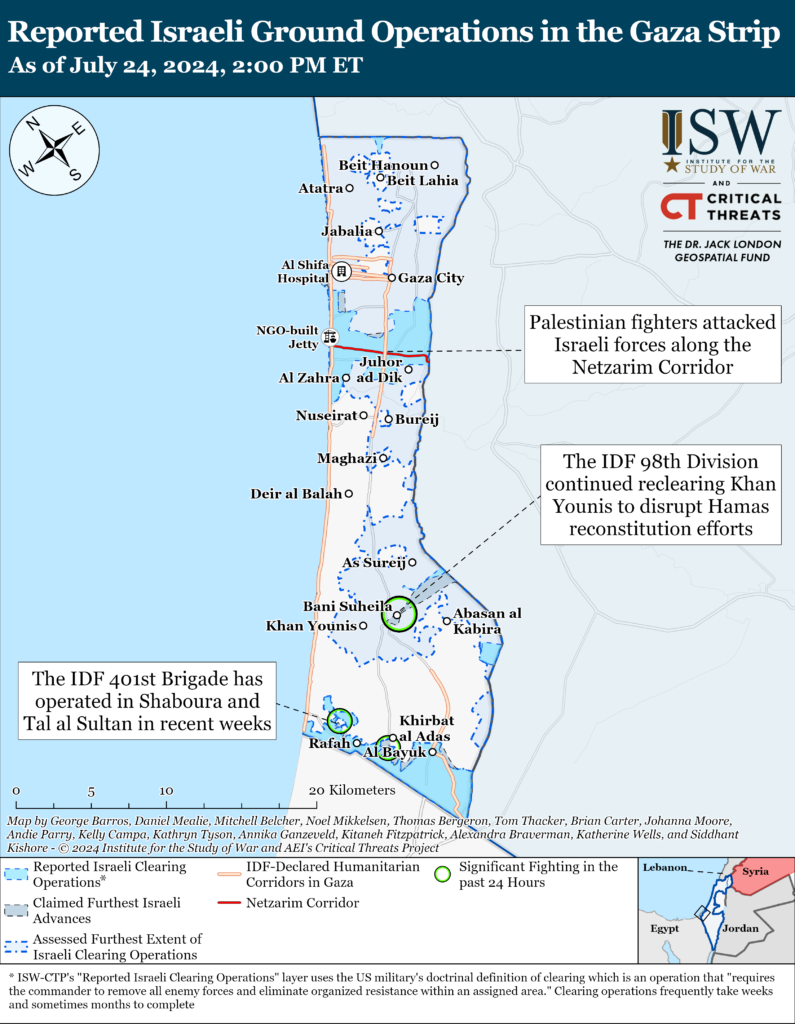
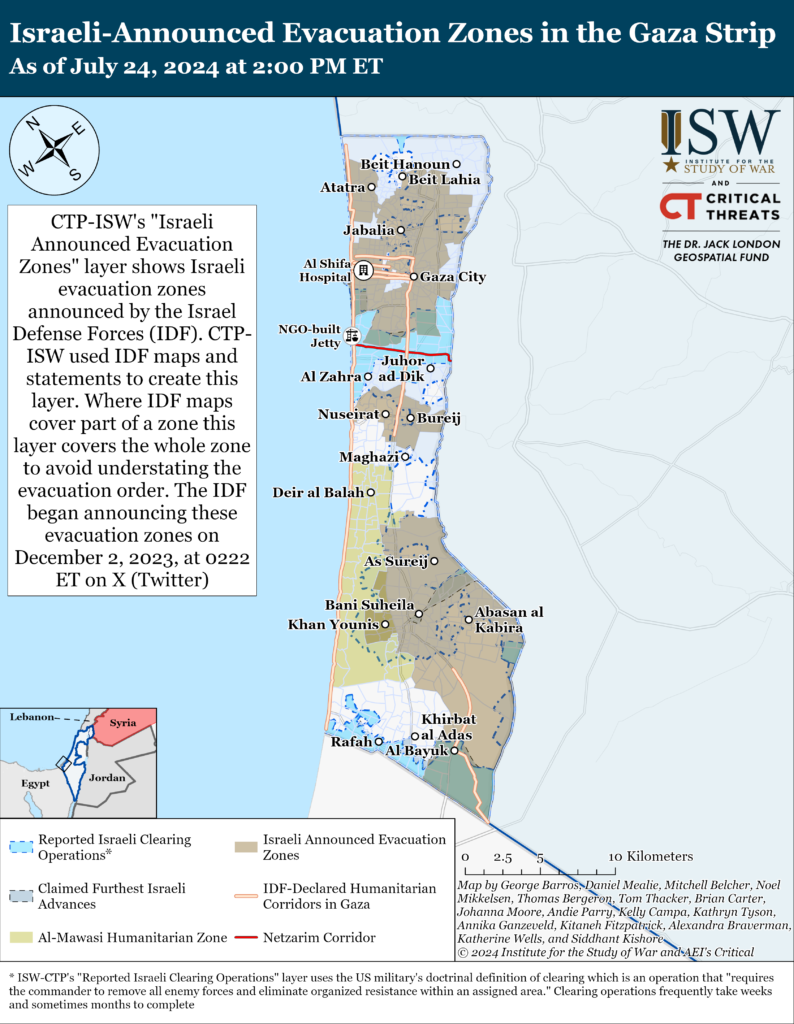
Two Palestinian militias conducted a single rocket attack targeting an IDF site in southern Israel on July 24.[42]
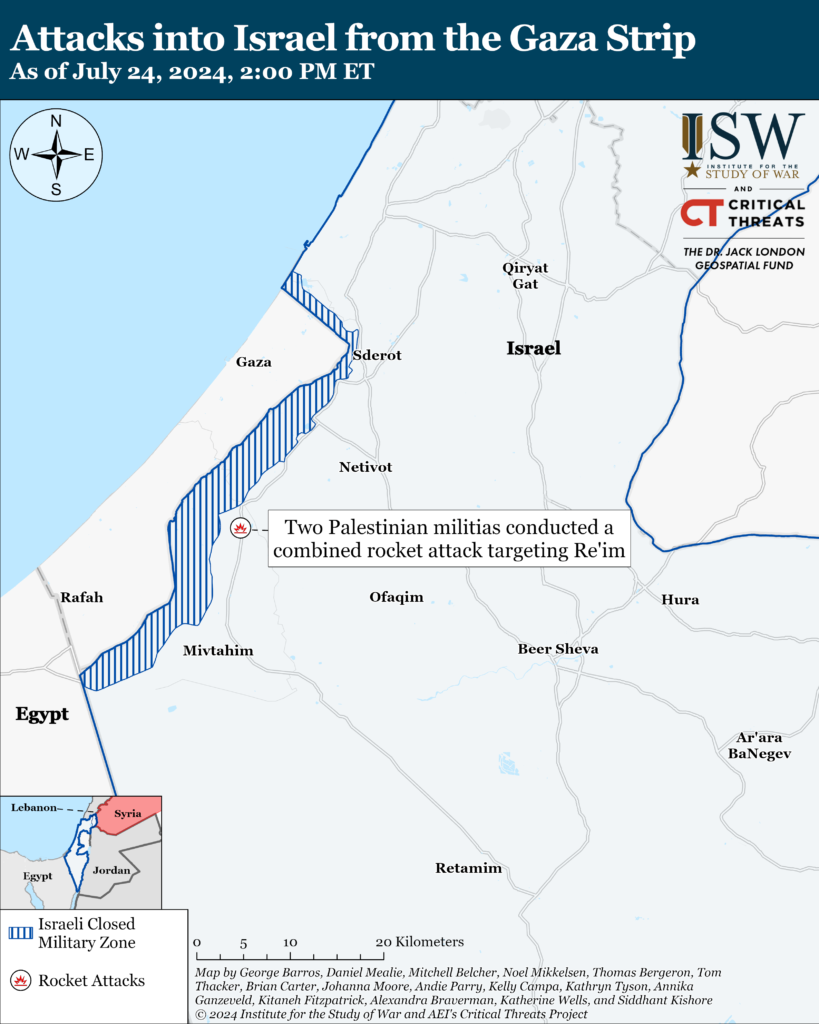
Recorded reports of attacks; CTP-ISW cannot independently verify impact.
West Bank
Axis of Resistance objectives:
Establish the West Bank as a viable front against Israel
Israeli forces have engaged Palestinian fighters in at least eight locations in the West Bank since CTP-ISW’s last data cutoff on July 23.[43]
Israeli forces demolished a house belonging to a Palestinian fighter and detained other Palestinian individuals in Qalandiya on July 24.[44] The Palestinian fighter who owned the house had killed two Israeli civilians near Eli settlement, north of Ramallah, in February 2024.[45] Israeli forces tried to disperse crowds that gathered during the Israeli operation in Qalandiya, including, by firing at certain individuals.[46] Hamas claimed that one of its fighters died during the IDF operation.[47]
Israeli forces detained two wanted individuals in Tubas on July 24.[48] The IDF engaged Palestinian fighters during the operation and killed an armed Palestinian Authority customs officer. The IDF is investigating the incident. The al Aqsa Martyrs’ Brigades fired small arms targeting Israeli forces in Tubas.[49]
Israeli forces detained five individuals during an overnight raid in Tulkarm on July 23 and 24.[50] An Israeli military correspondent reported that Israeli forces detained two individuals in Seida, Tulkarm, for their involvement in an IED attack in Hermesh, an Israeli settlement west of Jenin, that injured four Israeli civilians on July 18.[51] Israeli forces shot one suspect and arrested three others during the raid[52] The IDF previously conducted overnight raids and a targeted airstrike in Tulkarm on July 22 and 23 that killed two senior militia commanders.[53]
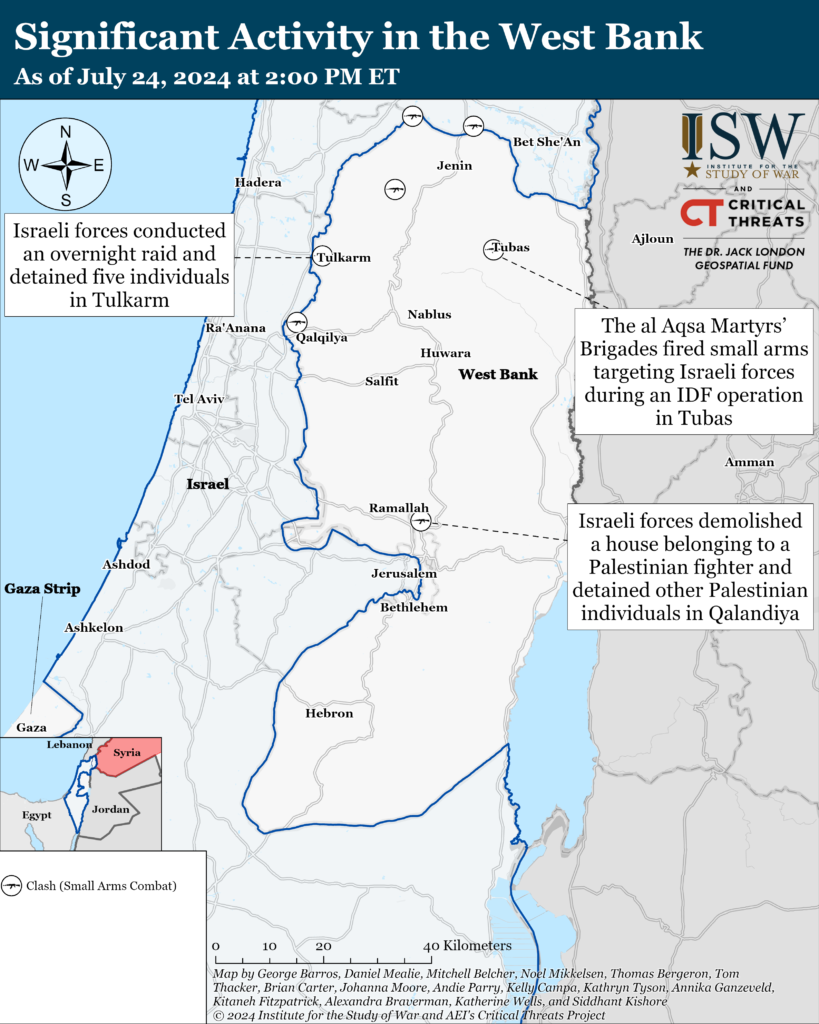
This map is not an exhaustive depiction of clashes and demonstrations in the West Bank.
Southern Lebanon and Golan Heights
Axis of Resistance objectives:
Deter Israel from conducting a ground operation into Lebanon
Prepare for an expanded and protracted conflict with Israel in the near term
Expel the United States from Syria
Lebanese Hezbollah conducted at least two attacks into northern Israel since CTP-ISW’s last data cutoff on July 23.[54] A Hezbollah rocket attack wounded an IDF soldier near Mount Dov on July 23.[55]
The IDF has completed military exercises simulating fighting in Lebanon in recent days.[56] A reserve unit from the IDF Northern Nahal Brigade practiced maneuvering in mountainous terrain and evacuating wounded soldiers under fire.
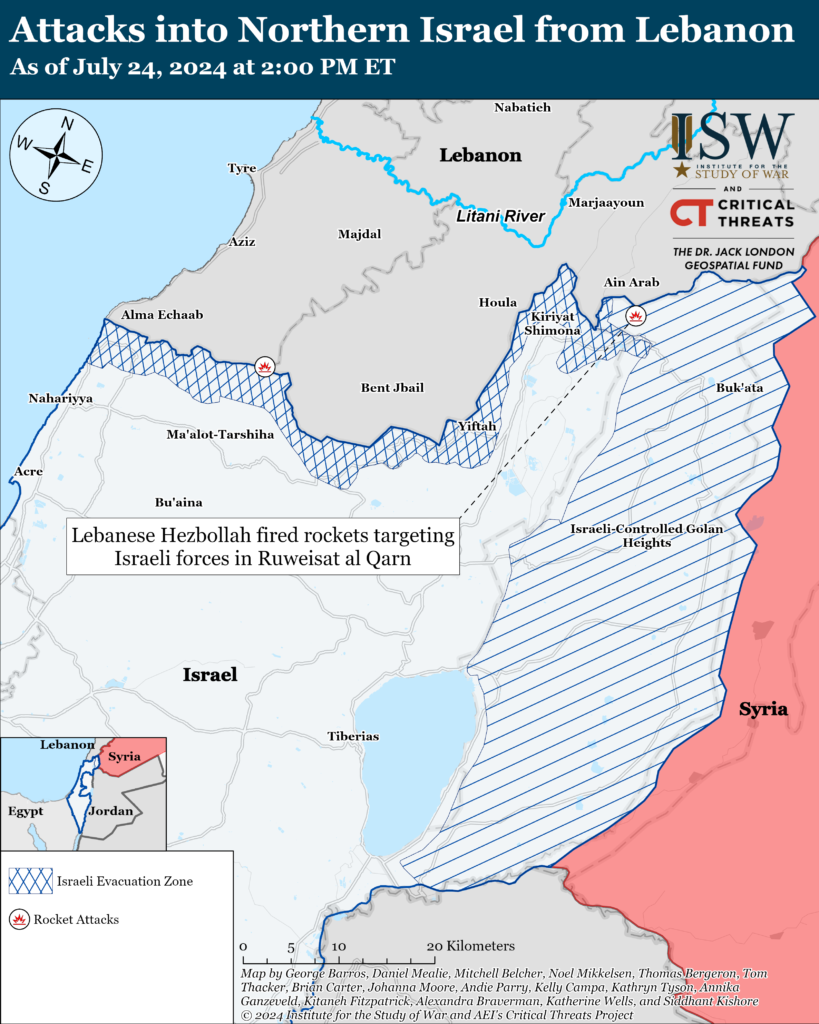
Recorded reports of attacks; CTP-ISW cannot independently verify impact.
Iran and the Axis of Resistance
Senior officials from the Axis of Resistance convened in Baghdad on July 23 and 24.[57] Houthi representative to Iraq Abu Idris al Sharafi met with Iranian-backed Iraqi militia Asaib Ahl al Haq Secretary General Qais al Khazali. Sharafi also met with Hamas representative to Iraq, Mohammad al Hafy, in Baghdad. These meetings come amid uncorroborated reports claiming that hundreds of Houthi fighters have traveled to Iraq in recent weeks to receive training from Iranian officers and drone and missile experts.[58]
The Islamic Resistance in Iraq—a coalition of Iranian-backed Iraqi militias—claimed a drone attack targeting Eilat on July 23.[59]
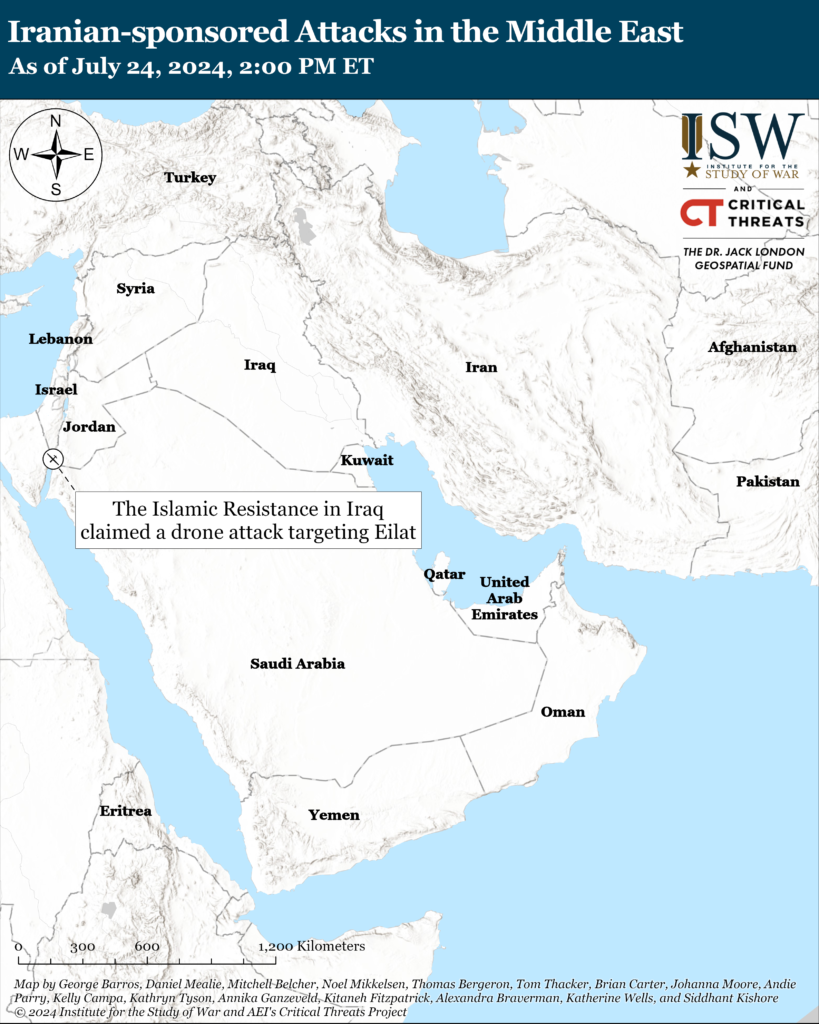
US Central Command (CENTCOM) destroyed three Houthi missile launchers in Houthi-controlled areas of Yemen on July 23.[60]
Iran is continuing to express solidarity with the Houthis following the IDF airstrike that targeted Houthi military targets in al Hudaydah, Yemen on July 20. The IDF conducted the airstrike in retaliation for the July 18 Houthi drone attack that killed one Israeli civilian in Tel Aviv.[61] Iranian Supreme Leader International Affairs Adviser Ali Akbar Velayati condemned the IDF airstrike and claimed that Israel could not have conducted the strike without US “cooperation and support” in a phone call with senior Houthi official Mohammad Abdulsalam on July 24.[62] Velayati condemned unspecified Muslim countries for failing to “confront Israeli crimes.” Acting Iranian Foreign Affairs Minister Ali Bagheri Kani similarly emphasized Iran’s support for the Houthis in a phone call with Abdulsalam on July 22.[63]
Iranian President-elect Masoud Pezeshkian sent a message to Palestinian Islamic Jihad (PIJ) Secretary General Ziad al Nakhalah on July 23.[64] Pezeshkian expressed hope that Palestinians will soon “liberate Jerusalem.” Pezeshkian previously sent similar messages to Lebanese Hezbollah Secretary General Hassan Nasrallah on July 8 and Hamas Political Bureau Chairman Esmail Haniyeh on July 10.[65]
Iranian social media users reported on July 24 that Iranian President-elect Masoud Pezeshkian will likely nominate prominent moderate politician Ali Larijani as his first vice president.[66] Pezeshkian has not confirmed at the time of this writing whether he will nominate Larijani. Larijani served as both the secretary of the Iranian Supreme National Security Council and Iran’s lead nuclear negotiator from 2005 to 2007.[67] Larijani also served as Iran’s parliament speaker from 2008 to 2020.[68] Pezeshkian’s nomination of Larijani would be significant given that the Guardian Council barred Larijani from competing in both the August 2021 and June 2024 presidential elections. A senior cleric previously claimed that the Guardian Council disqualified Larijani in June 2024 because allowing Larijani to become president could have increased the chances of his brother, Expediency Discernment Council head Sadegh Amoli Larijani, succeeding Ali Khamenei as Iran’s next supreme leader.[69] The Iranian Constitution does not require Parliament to approve the first vice president.[70]
Iranian Artesh Ground Forces Commander Brigadier General Kiomars Heydari appointed new commanders to Artesh Ground Forces Northeast and Northwest regional headquarters on July 22. Heydari appointed Brigadier General Second Class Cyrus Amanollahi as the Northeast Regional Headquarters commander.[71] Amanollahi had served previously as the 65th Airborne Special Forces Brigade commander.[72] The timing of his commandership is noteworthy given its coincidence with when elements of the Artesh Ground Forces, including the 65th Brigade, deployed to Syria in 2016 to defend the Bashar al Assad regime.[73] These deployments marked the first Artesh Ground Forces deployments abroad since the Iran-Iraq War.[74] Amanollahi had most recently served as the Northwest Regional Headquarters commander from September 2023 to his latest appointment.[75] Amanollahi replaced Brigadier General Second Class Reza Azarian, who had served as the Northeast Regional Headquarters commander since March 2017.[76] Heydari separately appointed Brigadier General Second Class Amir Hossein Shafiei to replace Amanollahi as the Northwest Regional Headquarters commander.[77] Shafiei has served as the 65th Airborne Special Forces Brigade deputy commander, 21st Hamzeh Infantry Division commander, and 25th Special Forces Brigade commander.[78]
Amanollahi and Shafiei will face various border security challenges in their respective areas of control. The Artesh Ground Forces Northeast Regional Headquarters recently began constructing a border wall in Khorasan Razavi Province along the Afghanistan-Iran border.[79] The construction of this wall comes amid an uptick in anti-regime militancy in eastern Iran since December 2023.[80] Iran also perceives a threat from Kurdish opposition groups that operate in Iraqi Kurdistan along Iran’s northwestern border.
Supreme Leader Ali Khamenei’s representative to the IRGC, Abdollah Hajji Sadeghi, appointed Brigadier General Ali Mohammad Naeini as the IRGC spokesperson and deputy public relations officer on July 24.[81] Naeini previously served as the head of the IRGC Sacred Defense Documentation and Research Center.[82] Naeini held various positions related to Iranian academia and culture in his career. Naeini replaced Ramazan Sharif, who had served as the IRGC spokesperson for over a decade. Sadeghi separately appointed Sadeghi Sharif to replace Naeini as the head of the IRGC Sacred Defense Documentation and Research Center.
Iranian Judiciary Vice President for International Affairs Kazem Gharib Abadi met with Chinese Ambassador to Iran Cong Peiwu in Tehran on July 23.[83] Gharib Abadi and Peiwu discussed expanding judicial and legal cooperation. Gharib Abadi stated that Iran “does not place any limits on the development of bilateral relations with China.”[84] Gharib Abadi further emphasized the importance of confronting US unilateralism.[85]
 Eurasia Press & News
Eurasia Press & News
